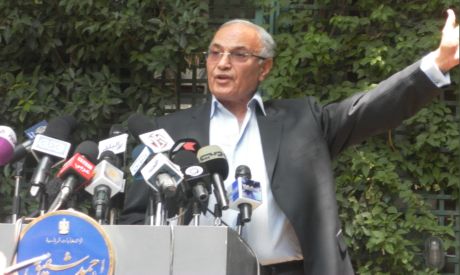 Presidential contender, Ahmed Shafiq, refuted Monday accusations by Wasat Party MP, Essam Sultan, that he had exploited his position as head of Young Air Force Officers Association by selling thousands of acres of state land in Ismailiya, earmarked for the Association, at reduced prices to Hosni Mubarak's sons.
Presidential contender, Ahmed Shafiq, refuted Monday accusations by Wasat Party MP, Essam Sultan, that he had exploited his position as head of Young Air Force Officers Association by selling thousands of acres of state land in Ismailiya, earmarked for the Association, at reduced prices to Hosni Mubarak's sons.
During a press conference held at his campaign's headquarters, a luxurious villa in Cairo's Dokki district, Shafiq defended himself with what he claimed to be official documents proving his innocence. The last premier under deposed president Mubarak also slammed Sultan, saying he was a former state security informant, who now dedicates a lot of time and effort to tarnishing Shafiq's image during the ongoing presidential polls.
Shafiq, however, would not substantiate his allegations against Sultan with tangible evidence, saying he had obtained all the information about the latter through "reliable private sources" and not during his short tenure as prime minister last year.
The sensational verbal joust between both men is widely expected to continue.
False claims
Escorted by his entourage to the villa's garden where the press conference took place, Shafiq kicked off his speech by apologising for arriving over one hour late because of other commitments. However, he did not waste any more time with introductions and started lambasting Sultan right away.
The presidential hopeful stressed the ongoing saga is just another endeavour by Sultan to hinder his presidential bid.
"First, he introduced the lame Disenfranchisement Law [in the parliament] that was especially tailored for me," Shafiq said. "And after my appeal was accepted by the Supreme Presidential Electoral Commission (SPEC) and I returned to the presidential race, he came up with fresh false claims about that land to hinder me."
The Disenfranchisement Law was supposed to prevent former regime members – especially those seen as participating in the arguably most corrupt last decade of the Mubarak 30-year tenure – from holding office or contaminating Egypt's political rebirth.
In Sunday's parliamentary session, a few days after the SPEC had allowed Shafiq to once again run for president, Sultan produced official documents including a contract allegedly showing the transactions in question.
Parliament speaker Saad El-Katatni asked him to show him the documents before referring the case to the public prosecution.
Shafiq, in detail, explained that he was not involved in the deal.
"This land was privatized in 1985; it emerged all of a sudden in the middle of the water as a result of the Suez Canal's operations, so for a while it was not clear to which authority it belonged to," Shafiq explained.
"Eventually, two parts of it were registered as fragment of the city of Suez, the last part belongs to Ismailiya," he added, while raising a document he said proves his side of the story.
"I was not the head of the Young Air Force Officers Association when Mubarak's sons [Alaa and Gamal] paid the money to buy the land in 1991. I was appointed as the third chairman of the association on 16 December, 1992," he stated while holding aloft another document. "I just notarised the deal in 1993 as the head of the association in a normal procedure.
"This Essam Sultan guy is supposed to be a law faculty graduate; can't he read the dates on these documents?!" Shafiq fumed, before adding, “The association's regulations also allow the sons of pilots to purchase pieces of land from the association, as long as they are members of the association."
Mubarak was the commander of the Egyptian Air Force in the 1970s.
"Sultan is working hard, along with others, to defame me; you [reporters] will see yourself in the next 10 days, recurrent attacks on me," Shafiq said. "I will take the necessary legal action to stop him and make him realise his real weight."
Sultan's history
Shafiq's aim was not only to clear his image but also to blemish Sultan's in the second part of the conference. He said Sultan has no principles and is only motivated by his own interests.
"Sultan was a representative of the State Security during the January 25 Revolution," the former aviation minister said. "I even know the name of the official whom he was reporting to, but I would only reveal his initials: H.A."
Most reporters conjectured that the initials refer to then interior minister, Habid Al-Adly, who is now standing trial on charges of instigating the killing of peaceful protesters during the 2011 uprising.
Mubarak's state security, an apparatus that was notoriously known for routinely practicing torture for many years, was dismantled a few months after the uprising.
"Moreover, Sultan was also commissioned to stand between (opposition leader and former presidential hopeful) Mohamed ElBaradei and the Muslim Brotherhoodand to prevent them from reaching an agreement during the revolution … his relations with the Kefaya movement was never pure too; again, he was acting as a spy," Shafiq claimed.
"He was licking boots and would do anything in order to found a political party (Wasat)."
These days, Shafiq believes Sultan is teaming up with the Brotherhood, the group Sultan used to be a member of, in order to defame him. He named group leading figure and once a presidential contender, Khairat El-Shater, as one of Sultan's associates.
"Sultan was used to expose the Brotherhood after his defection," Shafiq said without elaboration. "And I suspect that he also contributed to the jail time El-Shater spent [under Mubarak for corruption charges] but now they are working together against me.
"After all I am completely unfazed by all of this; nothing will affect my campaign or inhibit me from winning the presidency," Shafiq concluded.



